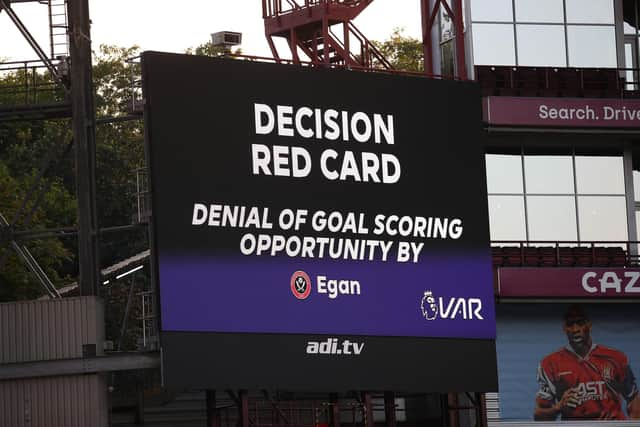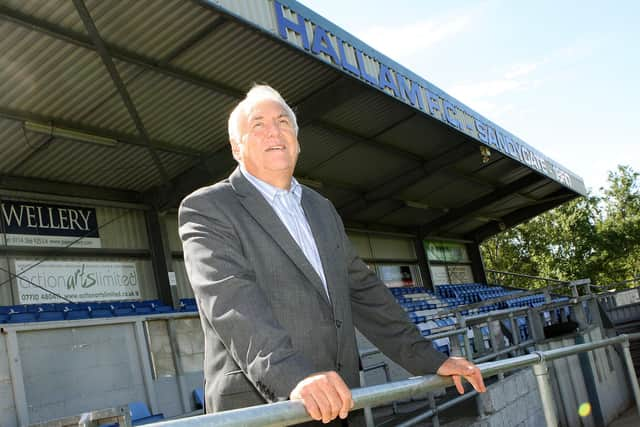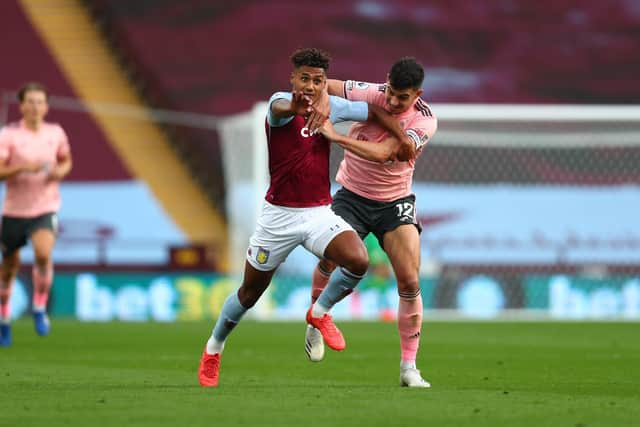One of football's most respected officials analyses some of the most controversial incidents during Sheffield United's recent games
and live on Freeview channel 276
Riley, in his guise as head of the Professional Game Match Officials Board (PGMOB), duly spoke with Wilder about a number of incidents. Their chat, however, took place before another controversial episode dominated the post-match agenda following United’s visit to Arsenal earlier this month.
Although the exact details of their conversation remain a secret, for reasons of both professional integrity and personal courtesy, The Star has dissected some of the most talked-about events to have occurred during United’s fixtures since lockdown with Keith Hackett, previously general manager of the PGMOB, and one of the most respected match officials of all time, to gain his expert input on what should have happened or why, in one instance, the man in the middle correctly interpreted the situation according to the laws of the game.
Advertisement
Hide AdAdvertisement
Hide AdJohn Egan’s red card against Aston Villa (21st September 2020)


James Shield’s description: Less than 12 minutes into last month’s match in the West Midlands, which United would go on to lose 1-0, Tyrone Mings seized possession from Oliver Burke and launched a long ball upfield. Completely bypassing the United and Villa midfielders, Egan found himself battling for position with Ollie Watkins as the two men hunted down Mings’ clearance - wrestling with each other in an attempt to reach it first - before Aaron Ramsdale raced out to clear. Referee Graham Scott then sent Egan off, after declaring he had denied the Villa striker a clear goal-scoring opportunity. A clearly incredulous Wilder, who also claimed John Lundstram had been made to wait too long before taking a penalty which he subsequently missed, wondered why Scott’s assistant, who seemed better placed to gauge what had happened, did not flag for a foul against the United centre-half.
Keith Hackett’s expert view: From my perspective, there was a foul on Egan and I would have expected the assistant referee to flag. He didn’t. The whole thing was compounded by a referee who wanted to ‘come in’ when he should have stayed out of the situation and allowed the game to continue. That, as I say, compounded the situation. I think it was a very harsh red card and a wrong one. I support Chris Wilder’s view that the situation could easily have been rectified. I think it was a poor piece of refereeing and I think Chris Wilder was right to feel wronged. It was six of one and half a dozen of the other so the action should have just been allowed to carry on. The referee had no need to get involved. When I coach referees, I always say “no surprises”. That was a shock, and it was in close proximity to the assistant referee.
Claimed foul on Sander Berge during the Yorkshire derby against Leeds (27th September 2020)
Advertisement
Hide AdAdvertisement
Hide AdJames Shield’s description: Only two minutes of normal time remained on the clock when Berge found himself battling to retain possession just inside United’s half. Jack Harrison, the visitors’ on loan winger, nipped away at the Norwegian’s heels and, with Liam Cooper also becoming involved, Mateusz Klich stole the ball, darted towards the penalty area, and then passed it to Rodrigo. He in turn found Harrison, who by this point had taken up a position on the flank and his cross was headed home by Patrick Bamford. It proved to be the only goal of the game and although Wilder later conceded United had created enough chances to have taken at least something from the fixture, he was angry that referee Paul Tierney had not spotted what he claimed was a clear foul on Berge during the build-up to Bamford’s finish.


Keith Hackett’s expert view: There was a foul. No question. The referee missed it. He wasn’t ideally positioned. He was ahead of the play actually. You can see, watching it again, that he’s almost looking over his shoulder because I suspect he’s thinking of where the next phase of play is going. The assistant referee should also have spotted it and I don’t know why it wasn’t picked up. Yes, you could go on and say that Sheffield United should have defended it. But this is the importance of the referee being judged on all of the decisions they make. This was a midfield foul and usually you would get away with it, but clearly not in this instance because the passage of play ended with a goal being scored. I would be critical of the referee in terms of his positioning and a lack of awareness that players commit offences, the ball doesn’t commit offences, and he was trying to anticipate where it was going I believe. Then, he’s been caught out. What we always say to referees is ‘hold your gaze’. It was right in the eyeline of the technical area, so the United coaching staff will have seen it.
David Luiz’s red card that wasn’t at Arsenal (4th October 2020)
James Shield’s description: There appeared to be little danger for Arsenal - or opportunity for United - at the beginning of this month’s contest at the Emirates Stadium when Luiz allowed a simple pass to roll in front of him. United’s Oliver Burke, though, was aware of the possibilities and nipped in to prod the ball towards Bernd Leno’s goal. The German raced out and cleared upfield. But before he did, Luiz tugged Burke’s shirt as he hunted the loose ball down. Referee Lee Mason did not send-off Luiz, much to the astonishment of both Wilder and Graeme Souness, who was covering the match for television. Indeed, Mason did not even award a foul against Luiz, simply allowing play to continue. United, who felt they should have played the majority of the match at a numerical disadvantage, went on to lose 2-1.
Advertisement
Hide AdAdvertisement
Hide AdKeith Hackett’s expert view: There was a clear foul but where I think he (Luiz) escaped focuses on part of the criteria which decide what is actually a goal-scoring opportunity; the likelihood of keeping or controlling the ball. That is law, keeping or gaining control of the ball. I recognise this is where a referee’s view might differ from the one held by a manager, who knows their players and if that would have been the case or not. All the other criteria for a red card appear to have been fulfilled, including the proximity of the defenders. I do think the referee should have awarded a free-kick, because an offence did take place. But the following are also things which must be considered - the general direction of play, the location of the defenders and, as I said, the likelihood of the attacking player keeping or gaining control of the ball. That is where the referee has correctly judged, in my view, not to award a red card. But it should have been a free-kick.


The Hawkeye failure at Aston Villa (17th June 2020)
James Shield’s description: Towards the end of last season, United travelled to Villa Park for the first match of ‘Project Restart’, after the English football calendar had been suspended for three months because of the Covid-19 pandemic. Two minutes before half-time, Oliver Norwood swept a free-kick into the hosts’ penalty area, which goalkeeper Orjan Nyland clearly carried over his own line. Television replays confirmed within seconds this was indeed the case. But because of what it’s owners later described as an unprecedented “level of occlusion”, the Hawkeye goal-line technology system failed to alert referee Michael Oliver to the fact. United’s players and coaching staff protested but play continued and the contest eventually finished goalless. Wilder later wondered why Tierney, who was on VAR duty, did not alert Oliver to the fact a clear and obvious error had been committed.
Keith Hackett’s expert view: Let’s go back to that one at Villa. I’m the guy who stood up, as head of referees, and asked for goal line technology. People at that meeting looked at me as if I was mad. When I was asked why I wanted it, I referred to what I’d seen happen at Manchester United, when Roy Carroll carried the ball over his own line during a game against Tottenham Hotspur in 2005. It wasn’t seen yet, take a snapshot, and everyone was in the correct place. I was closely involved in the development of Hawkeye too, and I’m aware that there are seven cameras on every goal with 99.9 per cent accuracy. I suspect, but I don’t know, that what happened was that they may not have been calibrated because it was the first match back or someone felt they couldn’t touch them because of the Covid protocols. The assistant was on the line and Michael, who is a terrific and experienced official, had players telling him what happened. I was surprised they didn’t go back and review it but you have to remember that, at the time, referees were being told to do that as little as possible so I think he’s been sold short by his bosses. Technology isn’t foolproof and so you always need to be aware of what your get our toute is if if doesn’t work. Unfortunately it’s incidents such as this which compound a lack of faith in officiating. It should have been reviewed.
